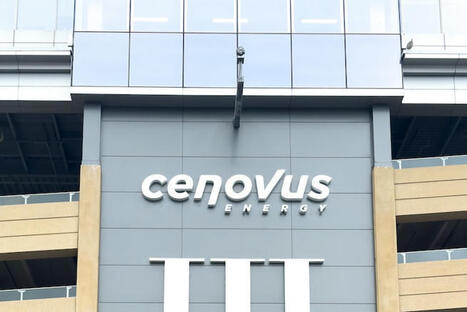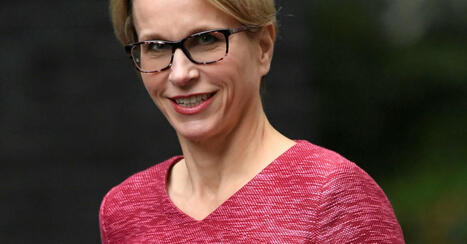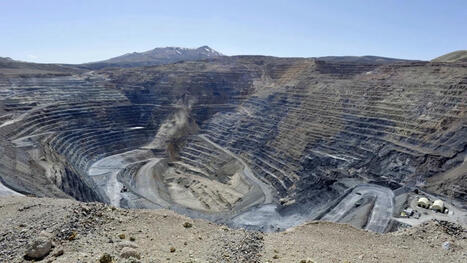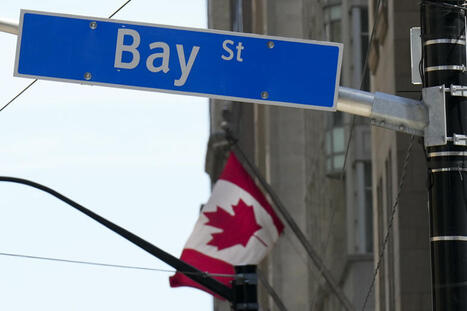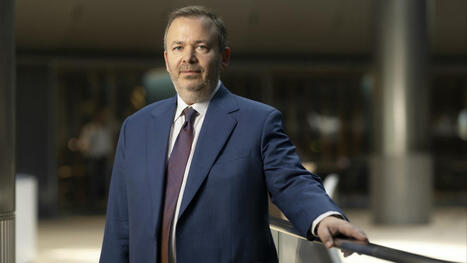 Your new post is loading...
 Your new post is loading...
Irenic Capital Management built a sizable stake in Workiva arguing the financial reporting software maker needs to improve its operating efficiency, refresh its board and consider a potential sale. Irenic owns roughly 2% of Workiva and has met with management numerous times to discuss possible changes to help the $4.7 billion company perform better, according to documents seen by Reuters and two people familiar with the matter. Specifically, the New York-based hedge fund is urging the Ames, Iowa-headquartered company to collapse its dual-class share structure, make all board members stand for election every year and add two newcomers, including Irenic executive Krishna Korupolu, to the board, the sources said. Irenic is pushing for Workiva to review strategic alternatives with fresh board oversight, capitalizing on strong private equity appetite for financial software companies, said the sources who were not allowed to discuss the private talks publicly. Workiva previously fielded interest from a private equity firm three years ago.
As disruption continues to reshape strategy, directors seek more risk-taking from their management teams, new survey finds. The world is moving at breakneck speed, and a new study by Corporate Board Member and the EY Americas Center for Board Matters reveals just how dramatically this pace of change is reshaping corporate governance. In new research conducted earlier this year among nearly 200 public company board members, nearly three-quarters of directors say their corporate strategy is in constant flux, with six out of 10 saying they expect their carefully crafted plans to need complete overhaul within just 12 to 18 months. This finding signals a fundamental shift in how boards must approach strategic oversight, with continuous strategic vigilance and adaptive governance. A closer look at what’s changing.
Le cabinet de conseil Institutional Shareholder Services (ISS) recommande un « soutien prudent » au projet d’acquisition de MEG Energy par le géant des sables bitumineux Cenovus Energy. Dans un rapport, ISS a indiqué que les actionnaires de MEG se trouvent face à un dilemme : l’offre de Cenovus n’est « ni convaincante ni opportuniste », mais il est incertain qu’une meilleure offre soit présentée. Cenovus a présenté son offre amicale après que MEG a rejeté une offre hostile de son homologue producteur de sables bitumineux Strathcona Resources. L’offre de Cenovus est composée d’environ trois quarts de liquidités, le reste étant en actions, tandis que Strathcona a récemment augmenté son offre et l’a modifiée pour la porter entièrement en actions. ISS a souligné que la dernière offre de Strathcona, également rejetée par MEG, comporte des risques que les actionnaires de MEG pourraient ne pas être en mesure de tolérer.
Occidental Petroleum is in talks to sell its OxyChem division in a deal expected to be worth about $10bn that would carve out one of the world’s largest standalone petrochemicals units. The Houston-based company, which is backed by Warren Buffett, has been steadily divesting assets in recent years in an effort to reduce its heavy debt load, which now stands at $24bn. Occidental is working with advisers on the sale process. The divestment, which would be Occidental’s biggest to date, was likely to be announced in the coming weeks, two people familiar with the matter said, provided it does not hit any last-minute hurdles. Occidental’s OxyChem division generated almost $5bn in revenues in the 12 months to the end of June. Occidental’s market capitalisation stood at nearly $47bn at Friday’s close. The identity of the buyer could not immediately be established. It was possible that the sale could still fall apart, the people warned. Occidental did not immediately respond to requests for comment.
Comcast announced Monday it’s named Mike Cavanagh as co-CEO alongside longtime leader Brian Roberts, starting in January. Cavanagh, who currently serves as president, will also be named to the Comcast board of directors at that time. Roberts will remain as chairman and co-CEO of the company. “Since joining Comcast a decade ago, Mike has proven himself to be a trusted and collaborative leader,” Roberts said in a statement. “He is the ideal person to help lead Comcast as we manage the pivot we are making to drive growth across the company. Mike and I work seamlessly together, and I am thrilled to be partnering with him as Co-CEO and with the rest of our talented management team, for years to come.” Cavanagh previously served as chief financial officer of the cable giant, which consists of a broadband, cable TV and mobile company as well as NBCUniversal. Before Comcast, Cavanagh was co-CEO of JPMorgan’s corporate and investment bank.
CEO Emma Walmsley will step down at the end of the year and be replaced by insider Luke Miels, the drugmaker said on Monday, a surprise switch as the British firm looks to rev up its pipeline and navigate U.S. trade tariff uncertainty. The move caps Walmsley's over eight years in the role that made her the most senior female CEO in the UK. She drove the spin-off of GSK's consumer healthcare business but never fully won over investors, with worries about a thinning pipeline. The shake-up comes as GSK faces a tumultuous wider environment with punishing U.S. trade tariffs, battles over drug pricing and increased demand for new medicines to head off patent expiries and declining revenues. Companies more broadly are shaking up leadership from fashion to retail. "Today, GSK is a biopharma innovator, with far stronger momentum and prospects than nine years ago," Walmsley, 56, said in a statement, adding that next year was key for the company and that it was the "right moment for new leadership".
Videogame maker Electronic Arts is in advanced talks to go private in a roughly $50 billion deal that would likely be the largest leveraged buyout of all time, according to people familiar with the matter. A group of investors including private-equity firm Silver Lake, Saudi Arabia’s Public Investment Fund and Jared Kushner’s investment firm Affinity Partners could unveil a deal for the publisher best known for its sports games as soon as next week, the people said. EA has long made games including FIFA, the soccer videogame now known as FC, and the football game Madden NFL as well as The Sims and other titles. The California-based company had a market value of around $43 billion before The Wall Street Journal reported on the talks, which sent the stock up nearly 15% Friday. Its shares closed at $193.35, a record high, giving the company a market value of around $48 billion. Discussions on price are still under way, but the deal could value EA at as much as $50 billion, two of the people said.
Global companies including Citigroup and McDonald’s have flocked to Canada’s bond market this year, drawn by strong investor appetite and cheaper borrowing costs, according to LSEG data, analysts and investors. The trend also reflects a growing willingness among issuers and investors to shift away from the dollar as uncertainty created by U.S. President Trump’s trade policies lingers. Issuance of “Maple bonds” by foreign borrowers in the Canadian market reached $16.32-billion as of September 25, outstripping the $13-billion for all of 2024 and edging past the $16.28-billion raised in 2023, according to LSEG data. That jump is partly due to cheaper borrowing costs, said Andrew Parker, co-head of the National Capital Markets Practice at law firm McCarthy Tetrault. “There was just one deal after another this summer. ... Rates in Canada have been more attractive,” added Parker, who worked on NextEra Energy Capital Holdings’ $2-billion (US$1.44-billion) Maple bond, one of the largest this year.
Barrick Mining appointed veteran executive Mark Hill as interim president and CEO on Monday following the sudden resignation of Mark Bristow, who led the Canadian miner for nearly seven years after its merger with Randgold Resources. Bristow, who became CEO in 2019 when Barrick acquired Randgold, oversaw integration of the two companies and steered the miner through a period of significant portfolio reshaping and debt reduction. “Disappointed to see him leave, he has been a fine leader,” said Peter Letko, of the Letko Brosseau investment fund, one of Barrick’s shareholders. Speaking in May, Bristow said the company had indicated he would stay in his current role until 2028, but added there was a succession program in place overseen by the board. Shares in Barrick, which owns 13 mining assets across Africa, Asia, Latin America, and North America, have lagged some rivals, rising by 37 per cent since 2020 compared to a 110-per-cent climb in shares of fellow Canadian miner Agnico Eagle with gold prices also hitting record highs.
Les chefs d’entreprise ont une longue liste de souhaits pour le prochain budget fédéral. Ils espèrent que le gouvernement du premier ministre Mark Carney aborde tous les sujets, de l’environnement d’investissement du pays à l’allègement fiscal et à l’amélioration de l’accès au capital. Si les industriels canadiens soulignent que le gouvernement devra faire des compromis quant à ses possibilités de financement, certains affirment que le soutien aux entreprises peut contribuer à améliorer la situation financière d’Ottawa en stimulant la croissance. « Nous souhaitons voir des initiatives qui ramènent le secteur privé dans l’économie et qui y investissent. Nous vivons dans un monde où les capitaux se font de plus en plus rares et où la concurrence pour les capitaux est rude », a déclaré Theo Argitis, vice-président principal des politiques au Conseil canadien des affaires. Il souhaite des mesures qui réduisent l’incertitude pour les entreprises et rendent le climat d’investissement plus favorable.
Federal regulators are scaling back obstacles for Boeing to deliver some of its newly produced aircraft to customers, a hopeful sign for the plane maker’s recovery from a string of crises. Boeing is regaining authority from the Federal Aviation Administration to perform final safety checks on its 737 MAX jets starting next week, the agency said. Employees of the aerospace giant would regain the authority to perform safety signoffs on alternating weeks, the FAA said Friday. FAA inspectors will remain involved in issuing so-called airworthiness certificates, which are required for each aircraft to be able to fly with passengers. “Safety drives everything we do, and the FAA will only allow this step forward because we are confident it can be done safely,” the agency said, confirming an earlier Wall Street Journal report.
Private companies, family-owned businesses and employee stock ownership plans (ESOPs) face unique challenges when conducting internal investigations. Unlike their public company counterparts, these types of businesses often lack robust, established investigative protocols. This absence of structured procedures can expose these entities to similar — if not greater — risks than public companies face, particularly when management and boards approach investigative inquiries without the benefit of well-established public company protections and oversight mechanisms.
It’s shaping up to be a busy autumn in private capital. Dominant players such as Blackstone are lining up their biggest companies for IPOs and the pace of dealmaking is accelerating, say industry leaders. In Europe, optimism is resurgent as private capital’s movers and shakers cavort at Germany’s Oktoberfest and a Parisian confab that’s always pencilled in as one of the industry’s big social events. At the annual IPEM conference in Paris this week, dealmakers said their global investors were clamouring to deploy capital on the continent, following both the instability rumbling out of the US administration and European leaders’ announced reforms. Philipp Freise, co-head of European private equity at US alternatives giant KKR, said some flows that would have gone to the US only a few months ago were now being reallocated to Europe. (He hastened to add that this did not mean the US was “less attractive . . . it’s just people diversifying more”.)
|
Days after his defiant speech at the United Nations rejecting demands to end the war in Gaza, Israeli Prime Minister Benjamin Netanyahu is set to confer with his most important supporter. But Monday’s meeting with President Donald Trump in Washington comes at a tenuous moment. Israel is increasingly isolated, losing support from many countries that were long its steadfast allies. At home, Netanyahu’s governing coalition appears more fragile than ever. And the White House is showing signs of impatience. The question now is whether Trump, who has offered steadfast backing to Netanyahu throughout the war, will change his tone and turn up the pressure on Israel to finally wind down the conflict.
Le régulateur américain de l’aviation civile, la FAA, va autoriser à nouveau Boeing (BA) à certifier certains 737 MAX, une première depuis 2019 et une suspension consécutive à deux accidents mortels. Un certificat de navigabilité atteste qu’un appareil présente les garanties de sécurité nécessaires pour voler. «La sécurité est notre priorité», a indiqué l’agence dans un communiqué publié vendredi, «et la FAA ne permet ce pas en avant que parce qu’il peut être réalisé de façon sûre». Cette décision, qui prendra effet lundi, a été prise après «une revue approfondie de la qualité de la production de Boeing», a précisé le régulateur. La FAA avait interdit cette auto-certification à Boeing depuis six ans, après les accidents de deux 737 MAX 8 en 2018 et 2019, qui avaient fait 346 morts au total. Elle va également lui laisser reprendre lundi la certification de certains 787 Dreamliner, prérogative dont l’avionneur était privé depuis 2022 et l’identification de problèmes de qualité.
Alors que la transformation numérique s’intensifie et que les avancées technologiques redéfinissent les modèles économiques, trop souvent les conseils d’administration (CA) concentrent leur attention sur l’évolution du marché, la performance financière, le contexte économique, ou encore les défis de recrutement et de rétention du personnel. Ils n’accordent pas toujours aux enjeux technologiques l’attention, la structure, ni l’imputabilité requis aujourd’hui. Or, l’arme secrète des CA les plus stratégiques réside dans la mise en place d’un comité technologique capable d’orienter, questionner et transformer les bouleversements numériques en opportunités. Dans un contexte de mutations rapides et imprévisibles, la technologie devient un levier central de croissance et d’innovation. Elle reconfigure les chaînes de valeur, les modèles d’affaires, les attentes citoyennes… et redéfinit les responsabilités fiduciaires du conseil. Il ne s’agit pas d’opposer gouvernance technologique, financière à celle des dimensions RH, risques ou réputation.
When Barclays awarded £500 in shares to 90,000 employees this year, its chief executive, CS Venkatakrishnan, said it was about “engendering a form of loyalty and identification with the company”. Midway through a restructuring, he wanted the workforce “invested in the results”. The bank, along with Rolls-Royce, Babcock and Aviva, are among the large UK companies that have handed out free shares to staff in the past year. Many have billed the move as part of a broader shift in employee incentives that aims to change how regular workers are aligned with their employer’s success. Barclays’ £50mn push, Venkatakrishnan argued, was as much about morale as money. “Pride comes from many things,” he said — from treatment of staff to what products and services a company offers, but also “financial success”.
CSX Corp on Monday has appointed Steve Angel as its top boss, replacing Joe Hinrichs, as the railroad operator fends off pressure from an activist investor while facing industry consolidation. Shares of the company rose about 3% in premarket trade. Angel succeeds Joe Hinrichs, who will work closely with the board and management to help with the transition, CSX said. He brings on more than four decades of experience, including at Linde plc and 22 years at General Electric where he was involved in locomotive and rail operations. The announcement comes after CSX faced activist pressure from Ancora Holdings to pursue merger options to replace Hinrichs. Hedge fund Toms Capital Investment Management also requested a meeting with the board at CSX in August after buying a stake in the U.S. railroad operator. U.S. railroad leader Union Pacific and Norfolk Southern earlier announced a surprise $85 billion deal, fueling speculation that CSX would explore a merger of its own.
Newmont said on Monday Tom Palmer will retire by the end of the year, in an unexpected move after spending more than a decade with the world’s largest gold miner. Rival Barrick Mining also announced the sudden resignation of Mark Bristow as CEO earlier in the day. Bristow had led the Canadian miner for nearly seven years after its merger with Randgold Resources. Both Newmont and Barrick face a period of significant industry transformation amid these leadership shifts. Palmer will step down on Dec. 31 and serve as a strategic adviser until his retirement in March next year. He had joined Newmont in 2014 and became the chief operating officer in 2016 before being appointed as CEO in 2019. During his tenure, Newmont completed transformative deals, including the Goldcorp acquisition, the Nevada Gold Mines joint venture, and the US$17 billion acquisition of Australian mining company Newcrest to create a top-tier global portfolio.
Advisory firm Institutional Shareholder Services Inc. is giving a lukewarm endorsement to Cenovus Energy Inc.’s $7-billion bid for MEG Energy Corp., a decision that will influence shareholders set to decide the battle for the oil sands company. On Friday, ISS said Cenovus’s cash-and-shares offer deserves “cautionary support” from MEG shareholders at a vote scheduled for Oct. 9. The proxy advisory firm favoured Cenovus’s bid over a hostile, all-share takeover proposal from Strathcona Resources Ltd. ISS and rival Glass Lewis & Co. have significant influence with index funds and other passive investors. These shareholders rely on the adviser firms’ voting recommendations and sometimes determine the winners of contested takeovers. Glass Lewis is also expected to release a recommendation to MEG shareholders by early next week.
AstraZeneca laid out plans on Monday to directly list its shares in the United States, as the drugmaker seeks to maximize gains from its biggest market and investor pool, even as it said that it was not exiting London. The decision to remain U.K.-based will be of some relief to British investors after media reports suggested the Anglo-Swedish drugmaker - London’s most valuable company - was considering ditching its U.K. listing in favor of the U.S. London’s stock market has been shrinking due to companies moving away for higher valuations and access to deeper capital markets elsewhere, particularly the U.S., prompting several listing reforms from British regulators. AstraZeneca said it would list its shares on the New York Stock Exchange and move away from the current depositary receipts structure, with a U.S. listing expected on February 2, 2026.
lgoma Steel Group Inc. has secured $500-million in federal and provincial funding to help it fight a brutal trade war that has decimated its order book. The Department of Finance announced early Monday that it is advancing Algoma $400-million in low-interest loans as part of Ottawa’s $10-billion Large Enterprise Tariff Loan program. The funding mechanism was put in place in March to help Canadian companies affected by U.S. tariffs. The Ontario government is providing an additional $100-million in loans to the Canadian steelmaker under the same terms. Federal Finance Minister François-Philippe Champagne said that the funding will help Algoma manage the impact of U.S. tariffs. “This investment is about helping them adapt operations, stay competitive, and most importantly protect the jobs and the workers who drive this industry,” he said in a press release.
Le mot « record » est souvent associé à la Bourse américaine. Or, la Bourse canadienne atteint elle aussi des sommets jamais vus. L’indice du S&P/TSX a pour la première fois dépassé les 30 000 points cette semaine en cours de séance, avant de redescendre légèrement. Il s’agit d’une hausse de plus de 21 % depuis le 1er janvier, contre 14 % pour la Bourse américaine. Comment l’expliquer ? Et la hausse va-t-elle durer ? On connaît le refrain : les grandes entreprises canadiennes sont moins dynamiques, moins diversifiées et moins innovantes que celles qui se trouvent au sud de la frontière. Pourtant, les entreprises canadiennes ont généré davantage de richesse pour les investisseurs cette année – tout ça alors que l’économie du Canada ralentit, et que Donald Trump « cherche à briser » l’économie canadienne, selon les mots du premier ministre Mark Carney. Depuis le début de l’année, la Bourse de Toronto (indice du S&P/TSX) a généré des rendements de 22,89 %, réinvestissement des dividendes inclus. Aux États-Unis, le S&P 500 a généré une croissance de 14,25 % durant la même période, dividendes inclus. La Bourse de Toronto frôle aujourd’hui les 30 000 points, alors qu’elle atteignait 20 000 points pour la première fois il y a quatre ans.
To strengthen shareholder relations and value, directors can help management craft a compelling total equity story by following this framework. In times of transformation and market volatility, companies must go beyond managing change to clearly show investors how they create and sustain shareholder value. Every company has an equity story, articulated or not, that is often more nuanced than management assumes. A strong equity story is not built on internal optimism; it is built on credible financial realities and a clear execution roadmap that speaks directly to public markets. At its core, it is about ensuring that the company’s strategy is relevant, the business model is viable, and management is accountable for daily operations while articulating the company’s value proposition to investors. When executed well, it shields against market skepticism, attracts long-term capital, and strengthens valuation multiples. To accomplish this, the company should actively engage with investors and be open to feedback, particularly when its stock price is stagnant.
A US activist investor that was behind a failed attempt to take control of seven investment trusts this year is set to launch the first exchange traded fund that targets perceived underpricing in the UK’s £267bn investment trust sector. New York-based Saba Capital is now preparing to launch an ETF that would allow it to build stakes and voting rights in its underlying investment trusts, allowing it to push for change and reap the benefits of any narrowing of the discount between their share price and the value of their underlying assets. Last year, Saba launched an aggressive campaign to seize control of seven trusts. Its effort resulted in some partial victories, with the Middlefield Canadian Income trust unveiling plans to become an ETF, an industry first, and other trusts agreeing to let some investors exit at a price close to their net asset value (NAV). However shareholders in the trusts overwhelmingly rejected Saba’s attempt to have its nominees elected to their boards. Boaz Weinstein, its founder and chief investment officer, was labelled a “blackjack raider”, a “greedy intruder” and a “vulture” by some commentators.
|




 Your new post is loading...
Your new post is loading...



